Coach Zlatko Dalić Announces Possible Croatia Formation Change for 2022 World Cup
February 4, 2022 - Zlatko Dalić spoke to Nova TV after the friendly tournament in Doha was announced, saying he will experiment with a Croatia formation change, namely three players in the back.
The Croatian Football Federation has agreed to represent the Croatia national team in a friendly tournament that will be played in Qatar in March, during which Croatia will play two matches. Namely, Croatia will play Slovenia on March 26, and Bulgaria three days later. In an interview with Nova TV, coach Zlatko Dalić commented on the national team preparations ahead of the 2022 World Cup.
"My wish was to go to Qatar, to prepare for what awaits us, what is to come in November, to get to know the climate, the terrain, and the ambiance. I am very pleased with this preparatory tour, these matches. They are not extra-quality opponents, but they are certainly good for us at the moment. We expect two really good games. We expect, of course, two wins and good play."
Dalić was asked if Croatia would try to play in a system with three players in the back. "Well, we're going to try to do something about it. We're going to have eight days now to try that. And that is in our plan."
Dalić desires to work on teamwork: "We want to spend those eight days in Qatar as one big team building event, to support each other. So far, every time we gathered, there was a lot of pressure, the imperative of a victory. This time, it is also imperative to win, but it will be a little more relaxed and supportive. We want these new players, and there are several of them, to get better acquainted with the national team and to create a new community."
Recall, the matches will be played at the stadiums in Doha, where the FIFA World Cup will be played. The exact timetables and stadiums will be defined later, and HNS will inform fans promptly about ticket sales.
To read more about sport in Croatia, follow TCN’s dedicated page.
Public School Partnership Designed for Foreign Children in Split Region Begins Summer 2022
February 4, 2022 - MISODIS partners with OŠ Kralja Zvonimira and trnsfr.hr to offer a hybrid model public school program tailored for expat families and foreign children in Split and its surroundings.
After starting the web project M.I.S.O.D.I.S (Multilingual International School Of Dalmatia In Split) in 2017, an important step has now been taken by partnering with the elementary school OŠ Kralja Zvonimira in Solin and agreeing on creating a welcoming place for foreign children and the families who want to move to the Split region.
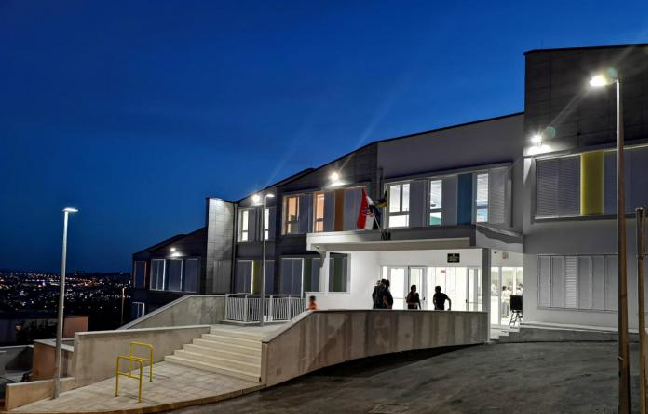
The school administration of the OŠ Kralja Zvonimira elementary school in Solin has agreed with Burak Canboy of the MISODIS project to welcome foreign children to their school immediately and has agreed on the future scope of cooperation.
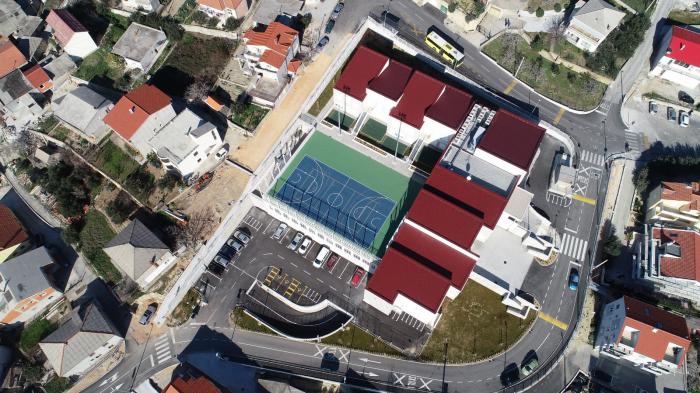
Until the end of May 2022, OŠ Kralja Zvonimira elementary school has agreed to review applications from foreign children (grades 1 to 8) to start visiting the school for the upcoming school year (2022/2023) even if the children are not living in the school’s district. The acceptance will be based on available space and existing class sizes and on a first-come, first-serve basis.
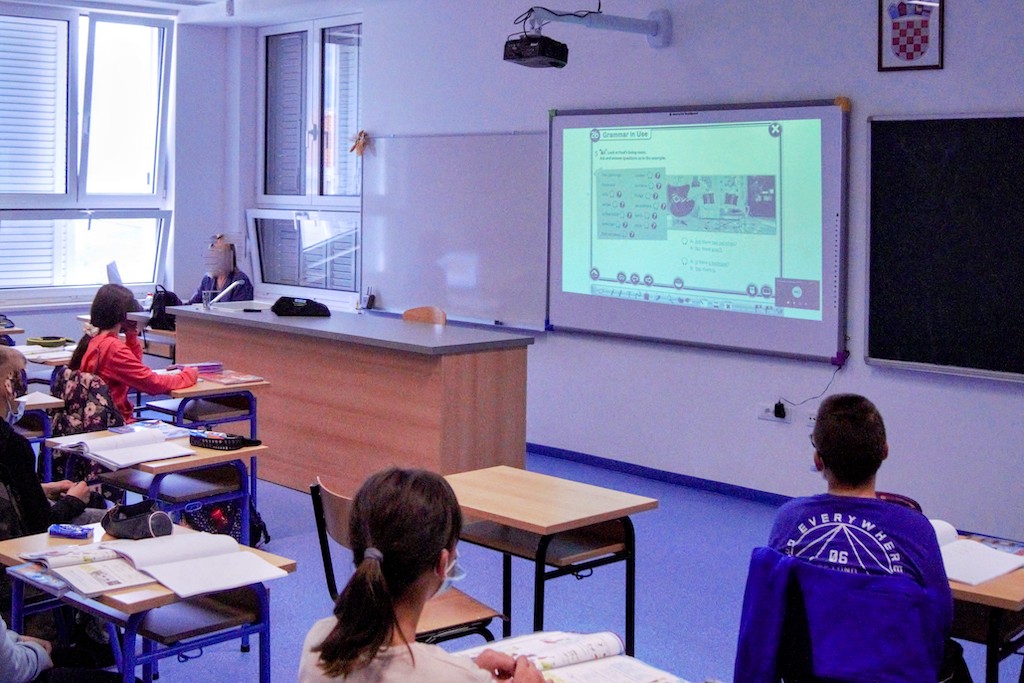
The school offers a full-day program (from 7:30 am to 4:30 pm) for children of grades 1 to 3. Children in grades 4-8 will be on bi-weekly shifts switching between morning and afternoon programs. Children who will newly arrive in Croatia will be supported by the school with the intensive Croatian language preparation course "pripremna nastava" and MISODIS will support the parents with advice and with contacts to online teachers and tutors.
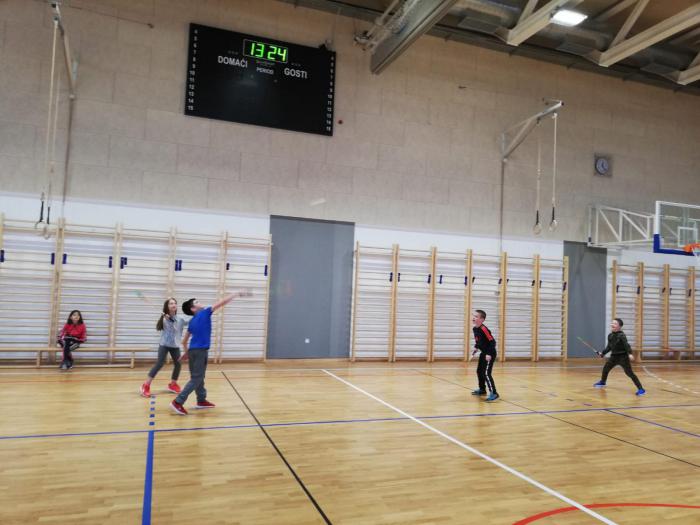
"Apart from the very good vibe and already existing experience the school has with foreign children, I was extremely impressed by the school's attitude towards implementing technical equipment and the immediate switch to online schooling to cope with the COVID-19 situation. With its motivated staff, new buildings, up-to-date equipment, kitchen facilities, and easy access from Split, Trogir, Omiš, and Sinj the elementary school OŠ Kralja Zvonimira is a perfect partner for our program," states Burak Canboy.
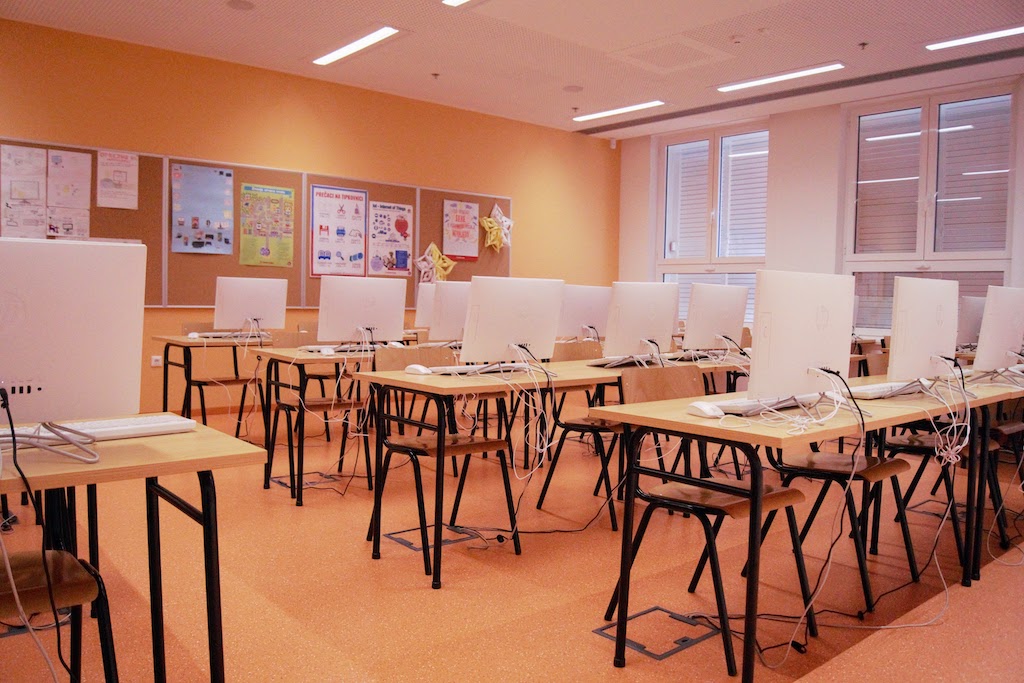
Ladina Putovanja d.o.o. with its VIP shuttle service trsnsfr.hr has offered to support the program with an at-cost service for families that wish to have their children picked up from home in the morning and dropped back off after school.
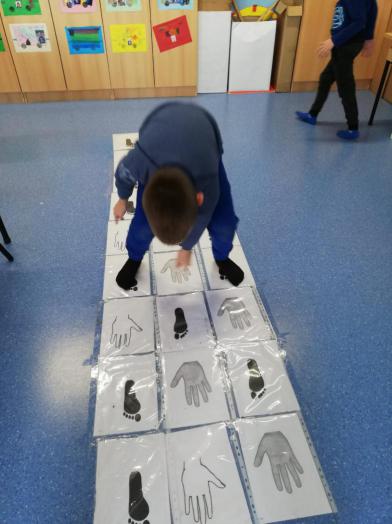
For the future, it is planned to also offer a full-day program for foreign children in grades 4-8 as a hybrid solution. The children will then participate in the regular public school program but would be able to stay on-site to participate in language classes and activities organized by MISODIS based on the needs of each foreign child. Additional fun activities would be made available off-site with local youth organizations. Such courses like climbing, robotics, creation of video content, art, programming, language courses, and more are already being reviewed.
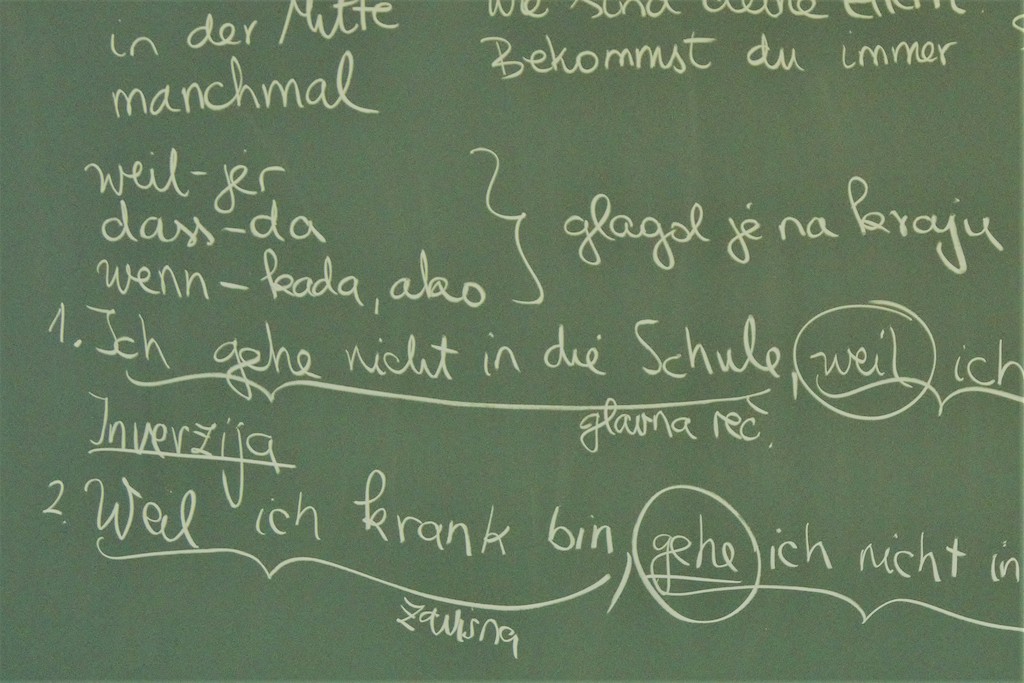
Special thanks go to Luka Vuković of Look@ for supporting the idea by making the introduction and moderating the first meeting and communications.
Contacts:
MISODIS
Burak Canboy
This email address is being protected from spambots. You need JavaScript enabled to view it.
+491606111832
Jessica Canboy
This email address is being protected from spambots. You need JavaScript enabled to view it.
+385915457306
OŠ Kralja Zvonimira
Marilena Babić
This email address is being protected from spambots. You need JavaScript enabled to view it.
+38521215536
School address:
BRAĆE RADIĆA 67, 21210 SOLIN
http://os-kraljazvonimira.skole.hr
trnsfr.hr (Ladina Putovanja d.o.o.)
Rok Novak
This email address is being protected from spambots. You need JavaScript enabled to view it.
+385958663415
For more, check out our lifestyle section.
Graffiti in Zagreb: A Cultural Landmark
February 4, 2022 - The Croatian capital Zagreb is abundant in graffiti ranging from quickly scrawled tags to large, colourful murals. Here is a look into the cultural significance of graffiti in Zagreb, including notable street artists, street art destinations, and its impact on the city's culture.
Zagreb is home to a few notable graffiti artists, recognized both nationally and internationally for their work, including OKO, Lonac, Lunar, Chez 186, Bare & Modul, and more. These artists all work under pseudonyms and display a signature style amongst their artwork.
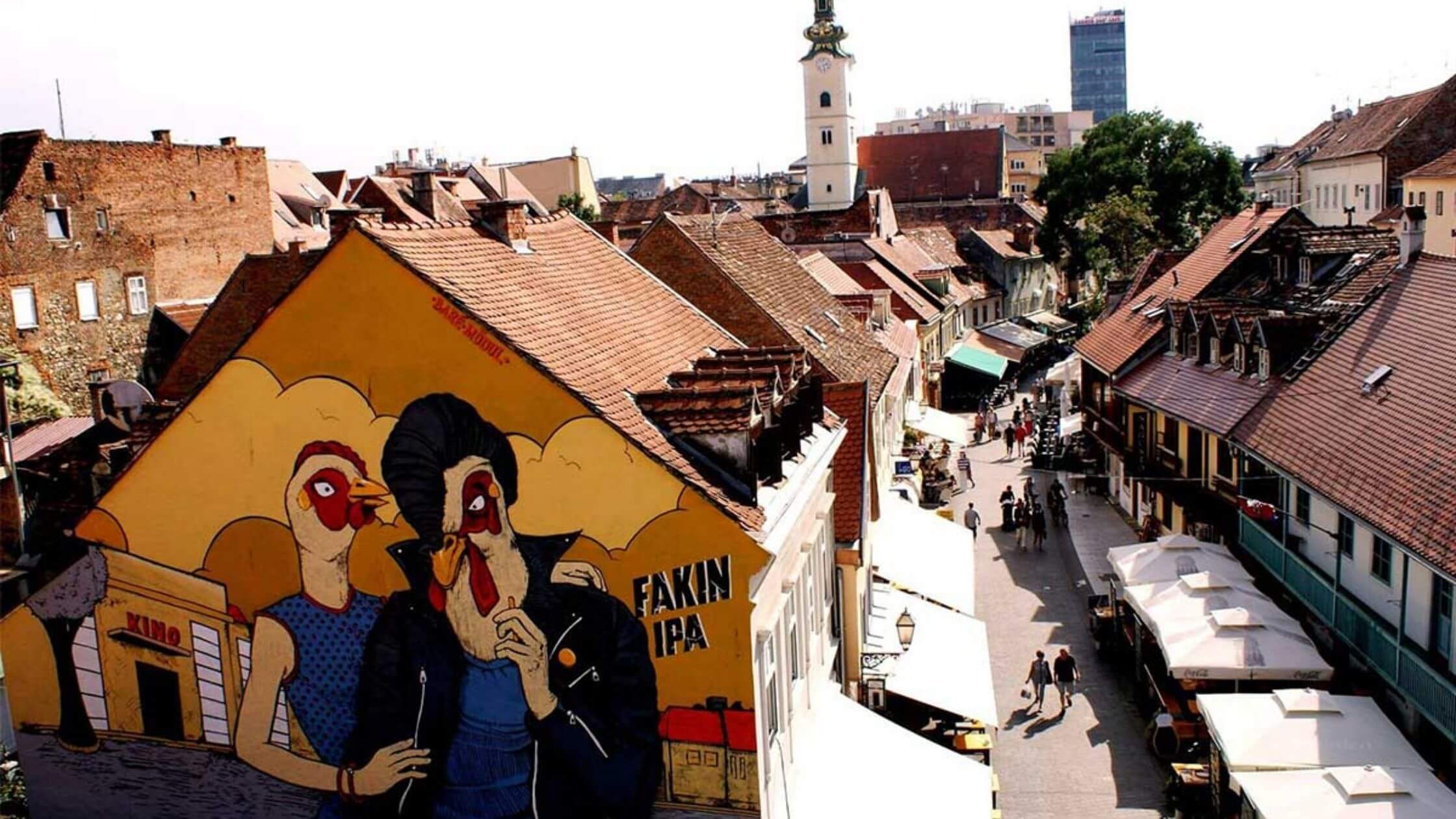
Bare & Modul: Fakin, painted for the Medvedgrad brewery. Photo: Bare & Modul
A fascinating characteristic shared by these artists is their chosen pseudonyms and how they symbolically represent themselves as artists as well as their work. For example, OKO (Croatian for “eye”) symbolically stands for one’s view of the world. The artist’s signature drawn eye, has visually represented the “inner eye” the artist believes we shall all use to look at the “depth behind everything and everybody”, rather than the “shallow image on the first glance,” ever since its debut appearances on Zagreb facades back in 2005.
In 2015, OKO’s 90 metre-long mural, Open My Eyes That I May See, was made as the adornment for the west-facing wall of Zagreb’s Museum of Contemporary Art. The artist has stated that: “Fluidity of street art is an excellent exercise in letting go. It cures you from having to own either material goods or spiritual achievements. It keeps you fresh because you have to keep creating”.
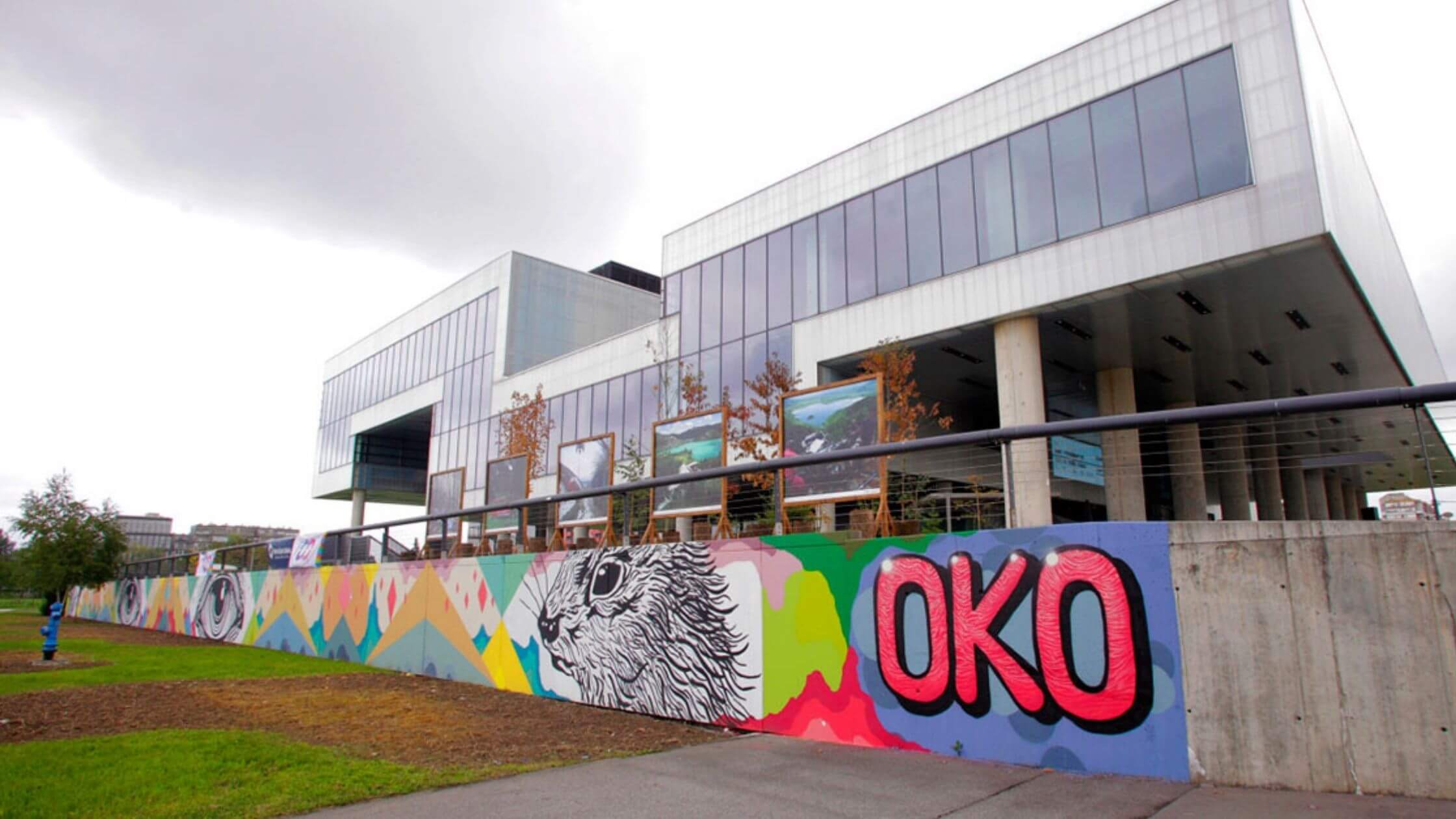
OKO: Open My Eyes That I May See, Museum of Contemporary Art. Photo: Kristijan Smok
Aside from the elaborate murals of the street artists, there is an abundance of textual graffiti, taking the form of mostly name-tags or sentences quickly scrawled onto walls. It would seem that amongst every public building in the city, there can be at least one of such phrases found on its walls, usually relating to themes of society, philosophy, politics, sport, relationships, money and work - to the mockery of writing on walls itself:
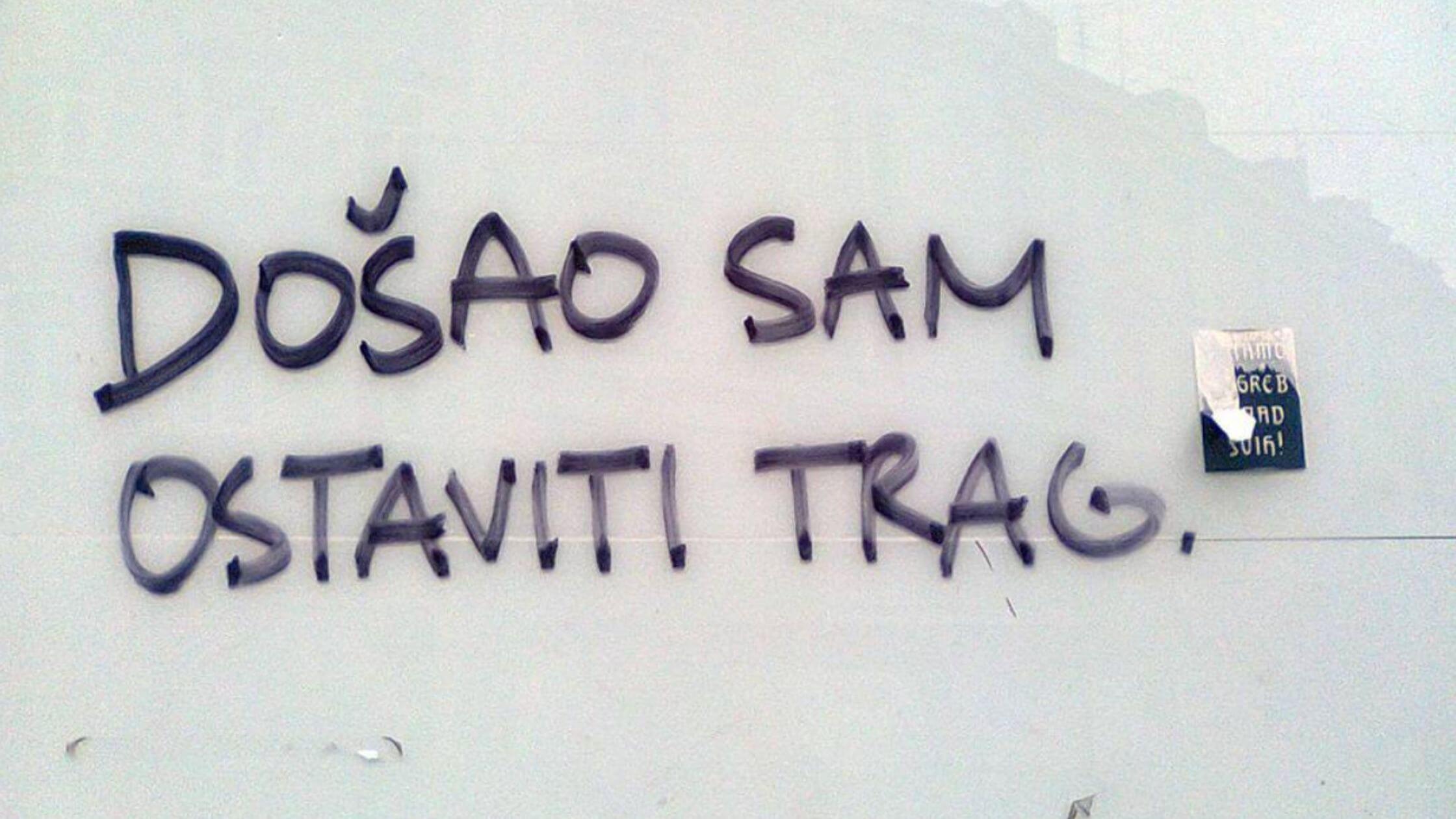
“I came to leave a trace” Indeed you have! Photo: ZAGREBAČKI GRAFITI/Instagram
All in all, they are communicated in a similar dry, sarcastic sense of humour, a display of Zagreb witticism. They have been acclaimed as a captivating and amusing way of expressing statements about society and other common themes, in such a way that it has become an element of youth culture.
Graffiti in Zagreb takes place mostly on privately or publicly owned property. However, many graffiti artists are given the chance to express their art in so-called “street art museums”. Namely, the Branimirova Graffiti Hall of Fame, established in 1999 on Branimirova Street and renovated in 2010 when 80 artists decorated the wall along Branimirova between the main railway station and the main bus station. Or the Zagreb Student Centre, with its endless blank walls for artists to showcase their work - it has received praise as a great open-space showroom of street art murals.
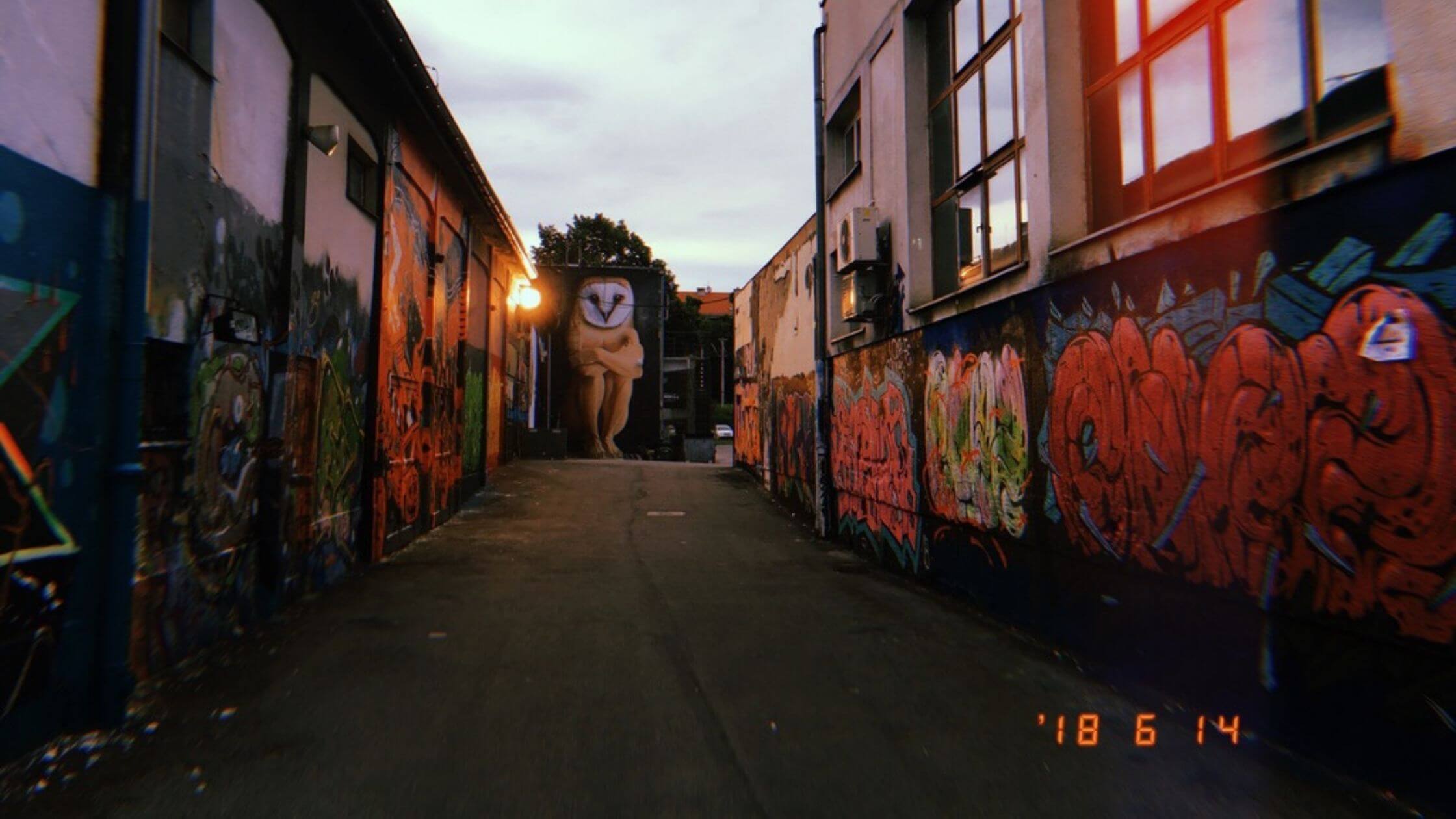
Inside the pathways of the Zagreb Student Centre. Photo: Vivi Albert
Yet, in midst of the praise, graffiti in Zagreb is still met with controversy over aspects such as its bold, striking appearance and the notion that it should not belong in public areas with historic significance, let alone privately owned buildings, as well as the belief that graffiti is an act of delinquency and a reason for youth to spread messages of disorder and provocation - which gives prominence to the boundary between art and vandalism that seems to exist within the art form. Graffiti in Zagreb has also faced controversy for its contribution to spreading messages of hate and antagonism, particularly fascism and xenophobia. But above all, graffiti has also been under fire of intolerant opinion of it not belonging on public display at all, regardless of whether it has been consented to, which boils down to merely an act of close-mindedness towards the art form as a whole. Regardless of where one stands concerning the polarising opinions surrounding the graffiti of any city, one can’t argue with the fact that it leaves an impact on its culture and is thus of significance to the city to some degree.
Graffiti in Zagreb has received praise not only for its artistic merit, but for being a major part of the city’s culture, from natives and tourists alike. Travel blogs such as Time Out are recommending Zagreb street art as a must-see in the city. There is even a street art tour, Meet Street Art(ist), the first and only street art tour in Zagreb, guided by street artists and other people involved in the street art scene in which one can learn about street art culture, meet street artists, visit galleries, and the unique Art Park, conjured by street artists as a space to display their murals and host workshops and events in a now popular “hang out” spot.
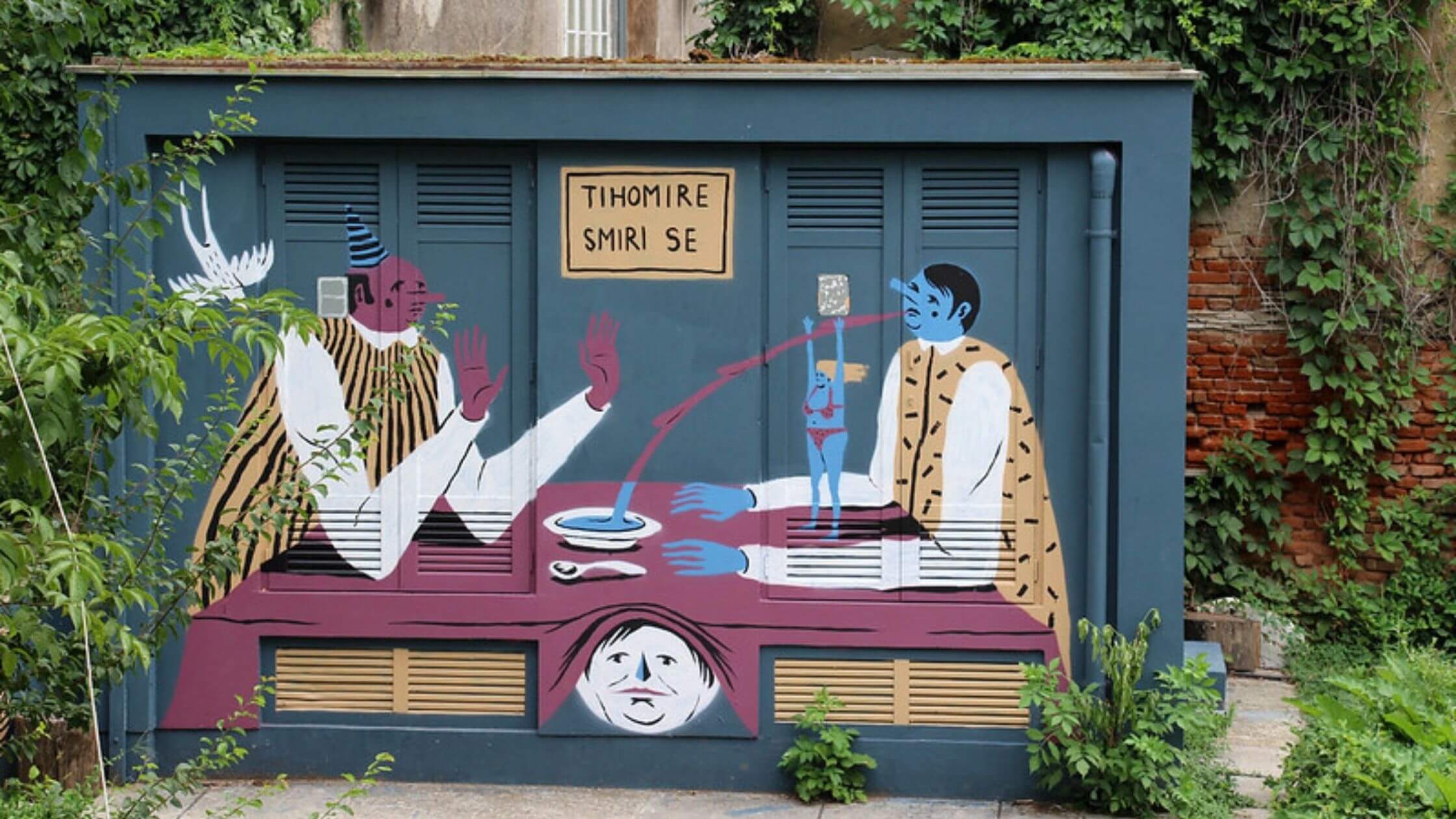
Wall in Zagreb Art Park. Photo: Fred Romero/Flickr
And for street artists, graffiti acts as personal guidance. To Chez 186, graffiti provides “financial safety and personal satisfaction, peace, and happiness above all”. To Šumski, each of his works is “one step towards something that doesn’t end. Each of these steps makes me who I am”. To Lonac, it’s a personal grounding: “For me, street art is a creation on the street. The work which you do belongs to you, everyone, and to no one. You can not sell it. It is a piece of the facade and that’s it”. To OKO, her art is a way of freedom and self-expression and, as she humorously puts it, “no meeting with curators or media, or anyone you need to explain your brain [to], except maybe cops if they catch you”.
To read more about Croatian arts and culture, check out TCN’s dedicated lifestyle page.
Osijek Mayor Lowers Kindergarten Fees for Certain Parents
February the 4th, 2022 - Osijek Mayor Ivan Radic has decided to slash the charges for certain groups of parents for kindergarten costs. Those parents in this Eastern Croatian city who needed to put their children into self-isolation because of coronavirus will get lower fees issued to them.
As Poslovni Dnevnik writes, there's been a bit of good news for the people of Osijek. Parents whose children were absent from kindergarten due to them needing to be in self-isolation or will pay less of a fee for kindergarten costs, reports local portal Glas Slavonije.
This is good news which was initially presented on Wednesday by Osijek Mayor Ivan Radic, who also explained that this is a proposal to amend the rules on the conditions and manner of the participation of parents in paying the price of early and preschool education programmes in Osijek kindergartens.
"Paying for the stay in kindergartens in these challenging times of the coronavirus pandemic is a very important topic that concerns all of us. Today, we're faced with the situation in which a large number of kindergarten groups are in self-isolation because of the children themselves, but also their parents, and even because of the staff, who are unable to work due to having contracted the novel coronavirus,'' said Osijek Mayor Radic.
"Specifically, for a period of three to five days, the price would be made lower by 20 percent, and in six to eight days, it would be decreased by 30 percent. It's important to note that this only applies to children's absence if it is related to COVID-19!'' the Osijek Mayor added.
This proposal is valid until March the 31st, and it included the month of January which is now behind us, so parents will receive a reduced bill in February for the previous month for those days when their children were absent from kindergarten due to needing to be placed in self-isolation.
For more, check out our lifestyle section.
Croatian Energy Investment: New EU Plan to Inject 6 Billion Euros
February the 4th, 2022 - Croatian energy investment with a European Union (EU) plan to pump in a massive 6 billion euros is attracting a lot of talk among those in the sector.
As Poslovni Dnevnik/Darko Bicak writes, as announced back at the end of last year, the European Union recently presented a plan which, despite being controversial for some, will consider new investments in nuclear energy and gas thermal power plants. On top of that, it will make infrastructure environmentally sustainable, ie green, which means that it will be facilitated institutionally through EU funds and private investments in such projects.
The supplementary delegated act on the taxonomy of climate sustainable activities to mitigate and adapt to climate change, which covers certain energy activities in the gas and nuclear sectors, is particularly interesting for Croatia and Croatian energy investment because there are several projects that could be financed directly from EU funds on that basis.
First of all, we can look at the second block of the Krsko Nuclear Power Plant, which is primarily planned to be built by the neighbouring Slovenes, for which the first permits were issued last year. Croatia is not indifferent to the project and is likely to participate in it. The Krsko NPP was built back in 1983 and it has remained unchanged to this day. It represents an investment, as well as maintenance and the distribution of energy in equal proportions between the two neighbouring nations of Slovenia and Croatia.
Although there are no details about that yet, it is certain that such a model would be applied to Block 2. The estimated cost of the project is between six and 10 billion US dollars, according to green activists in the wider region who oppose expanding nuclear capacity in Krsko and point out that it is, in addition to being dangerous and archaic, too expensive and unprofitable in regard to technology.
It is interesting that most of the opposition to the upgrade of Krsko comes from Austria, where there is a common position of politicians, as well as from the public and activists that this project must be prevented at all costs. Over more recent years, Croatia has invested heavily in gas infrastructure, and a similar trend is expected in the coming period. The LNG project on Krk proved to be important and functional, as an example. All energy experts have warned for the past 20 years, as far as this project is concerned, that LNG gas is too expensive and unprofitable compared to natural gas coming through gas pipelines.
That being said, they also didn't deny that this is a strategic infrastructure project that will give Croatia and the wider region, through energy diversification, much greater geopolitical power in the event of a political or energy crisis in Eastern Europe or the Middle East. A certain level of instability in the Middle East has become a normal situation for several decades now, and trade and energy flows have learned to "live" with it. The current crisis between Russia and Ukraine has been going on for about ten years, and it has recently escalated again, so the possibility of a war that could range from a low-intensity hybrid conflict through a spatially and temporally limited armed conflict to something continental and of global proportions is something we don't even want to think about at the moment.
Gas prices have risen from about 30 US dollars per megawatt (MWh) to almost 100 dollars. Recently, gas on the reference European gas exchange TTF in the Netherlands was just under 80 dollars. Therefore, it is clear that the existing floating LNG, worth a massive 234 million euros, of which the EU gave Croatia 100 million, has already justified its existence today and the authorities are probably already planning the second phase of the project - building a fixed terminal on the coast and increasing the existing capacities of 2.6 billion cubic metres of gas per year. It appears that Croatian energy investment isn't going to stop there, either.
Croatia has turned almost all of its city heating plants, mostly owned by HEP, into gas power plants, and although the authorities have been pretending over more recent years that the Plomin C project doesn't actually exist, nor has it ever existed, it is increasingly likely that, with its originally planned coal technology, it will also be constructed as a large gas power plant, perhaps on LNG given that this thermal power plant has its own port for docking ships, either for unloading coal, or in the future on LNG.
Additionally, a plan of a private investment in a hybrid gas thermal power plant in Slavonski Brod with a total capacity of 500 MW and an estimated investment value of 420 million euros has been operational for about fifteen years now. Only the listed projects in half of NPP Krsko, the fixed LNG terminal, Plomin C and TPP Slavonski Brod total almost six billion euros and it is clear that the new and green EU classification of nuclear and gas technology will have a great positive effect on Croatia and Croatian energy investment as time goes on.
The presented EU proposal will have to be studied by national governments in the coming period, and before it is officially adopted. The fact is that the EU has 27 member states and that each of them has its own energy strategy and position on the positive or negative effects of a certain form of energy, but the EU has come to this in such a way that one or several countries cannot veto the decision. The EU's plan will be rejected only if 20 member states oppose it, and it is already clear that countries like the Netherlands and Denmark don't want gas involved in the Green Plan, because they use it less and less and sometimes even reject it, while on the other hand, gas is of existential importance for Germany.
The nuclear lobbies in the EU are led by France and the Czech Republic, which are the loudest of them all, and aren't typically opposed by many other countries, which have both realised that they will NOT ensure their energy independence for many years to come. Many green associations and institutions, on the other hand, warn that it will be a step backwards because it will make it difficult and stop many renewable energy projects and give the public the so-called Greenwashing, or a false notion which convinces the public that the products, goals and policies of this plan are environmentally friendly.
The Ministry of the Economy and Sustainable Development pointed out that the Republic of Croatia, in accordance with the stated policy and its strategic documents in the field of energy, "Energy Development Strategy of the Republic of Croatia until 2030 with a view to 2050" and the “Integrated National Energy and Climate Plan for the Republic of Croatia”, encourages the development of renewable energy sources and the strengthening of energy efficiency.
"In this policy, we can see a number of opportunities for the Croatian economy, especially in the development of new technologies dedicated to renewable energy sources. In order to ensure further economic development, as well as a sustainable transition to clean and climate-neutral technologies, we believe that the inclusion of investments related to natural gas and nuclear energy can have a positive effect on the decarbonisation processes. Of course, all of the above must be dedicated to the ultimate goal of decarbonisation, both of the energy sector and of the economy as a whole,'' said the aforementioned ministry, headed by Minister Tomislav Coric.
For more on Croatian energy investment, check out our politics section.
Adriatic Festivals to Return With Higher Prices Following Stagnation
February the 4th, 2022 - Adriatic festivals up and down the Croatian coast are set to make a return, albeit with higher prices included, following two years of painful stagnation as a result of the coronavirus pandemic and its accompanying restrictions on gatherings.
As Poslovni Dnevnik/Marija Crnjak writes, although they still have some reservations about the continuation of the global coronavirus pandemic and the issue of limits being placed on things such as international travel, and there are even more worries about inflation, the organisers of music festivals in Croatia seem to be relieved after two seasons of pure stagnation.
Adriatic festivals are set to return, and the famous Zrce already has a record booking with the return of some old and some new projects, Ultra is preparing for this year in Split and on the Dalmatian islands, Sibenik's Martinska, which last year showed impressive resilience to dire circumstances, is preparing for the summer and some new cooperation, and some Garden Resort festivals are already sold out.
Although only time will tell if the party business will return to the tracks off which the pandemic forced it back in 2020, optimism is currently high when it comes to Adriatic festivals in 2022.
Ivan Busljeta, the owner of the Papaya club on Zrce, is making no attempt to hide his sense of optimism. The most famous location of the entertainment industry in the entire country has been alive for the last two years with guests from across Croatia and the country's immediate region, without the usual international audience and the festivals that used to put this place firmly and at the very top of the Adriatic festival map.
Everyone missed the British market in the first place, which is crucial for the entire festival scene whether it be regarding guests or business partners, and the opening policy for travel now announced from the United Kingdom for the coming summer is an important stimulus.
"All of the old festivals are returning to Zrce this year, we start on May the 15th and the season will last until September the 15th. We'll start with the Zrce Spring Break festival, which brings 5,000 people to Novalja, the English festival Hideout with 15,000 visitors, then Sonus, the largest techno festival with 15,000 guests. At the end of June, the Fresh Island will return, and we have new partners from England who will also bring us several thousand people.
So, the numbers are phenomenal at the moment and I hope that the current narrative will be maintained, that all of the epidemiological measures will cease in the spring and that the novel coronavirus will be treated as a cold or flu and we will live a normal life again,'' Ivan Busljeta hopes.
In that light, Ryanair’s announcements are good, and reservations continue to be record-breaking for the low cost Irish airline. At the same time, enterprises working on Zrce are happy with Novalja's plans to invest more cash in local infrastructure, from a new marina and reception port to more roads, which is the basis for further investments in other facilities.
"There are new investments in 4 and 5 star accommodation, camps, a lot of private villas are being announced and realised, which could encourage the development of new segments of tourism on the island of Pag, for which there is a lot of potential. Just as Zrce still has a lot of potential for development, in which we have great support from the local community, the whole destination has the potential for the development of sports, adrenaline, gastronomy and even family tourism,'' said Busljeta.
What is worrying is the situation surrounding inflation and the rising prices of just about everything, which will spill over into the prices charged for varying services in all segments of tourism, from accommodation to catering and hospitality to basics like transport.
Although ticket sales are currently in the early bird phase, final festival ticket prices as well as other ancillary services are likely to rise, in order to maintain the viability of the business, especially after two years of stagnation.
Vedran Meniga, the co-owner and director of the company Positive Rhythm, one of the pioneers of the festival business in Croatia, is still looking forward to the next season and for Adriatic festivals to hopefully make at least a semi-normal return.
In addition to the famed Martinska location in Sibenik, Positive Rhythm, in partnership with Garden Resort, organises festivals in Tisno, and this year important anniversaries of their events are being prepared. The current state of reservations looks good, but Meniga also cautiously remembers last year's relaxation just before the summer.
“Although we strive to maintain the same standard at this early stage of ticket sales, we're part of the rest of the world as well and it's logical that we;ll have to adjust to prices as time goes on. We're also continuing to work in uncertain circumstances, although at the moment the situation looks better than it did last year. Still, let's remember that at the beginning of last summer there was an optimistic announcement from the British market, and later that all changed. In addition, the policy of adopting anti-pandemic measures in Croatia last summer worked against event organisers, we had to cope with the adoption of measures overnight, there were double standards, which is why last year was more stressful for event organisation than 2020.
Due to all of the above, we still have valid reservations, because we're aware that for sustainability, in addition to the local audience, we need foreign guests,who buy tickets in advance and plan a full trip. That said, we're currently working on Plan A, as if everything was normal, but we're ready for Plan B, depending on the situation as it unfolds,'' explained Vedran Meniga.
It's worth noting that Positive Rhythm was declared a possible world record holder in the number of festival and club events held in the two pandemic years behind us, with more than 10 thousand visitors in 2020 alone.
All six Adriatic festivals will be held on Martinska again this year at about 50 percent of the capacity from back in pre-pandemic, record 2019, with the 20th edition of their festival Seasplash and the tenth edition of Regius set to take place. The Slurp Festival will host a small overseas collaboration, for which the campaign will start in a couple of weeks, in addition to which the punk festival Kanal Fest, Membrain and Blast Fest are expected.
On top of the above, the Garden Resort in Tisno will be hosting the Outlook Festival, for which the first performing names have been announced this week, with tickets starting to be sold this Friday, while Dimensions is due to take place as ''normal'' in September.
Due to cost-effectiveness, Brexit and even the coronavirus pandemic, these Adriatic festivals eventually transformed into smaller ones, but apart from the local audience and the expected return of the British tourists and business partners, guests from distant, non-European markets such as America and Canada also showed interest.
For more on Adriatic festivals up and down Croatia, check out our travel section.
Croatian Public Notaries Look to German Example and Go Digital
February the 4th, 2022 - Croatian public notaries are looking to Germany and adopting a much more digital approach. To those of us who have utilised public notaries (and their infamous stamps) in this country, this will come as very welcome news.
As Poslovni Dnevnik/Suzana Varosanec writes, the mandate of the new leadership of the Croatian Chamber of Notaries (UHJK) is looking promising and much more digital indeed. Through the continuation of digitalisation of notary services, we can expect even more services to be made available on screen, including a high degree of legal certainty and dispute prevention, and services involving legal affairs which are related to property rights.
Bodies for a new three-year term were elected at the election assembly, and the president is Zvijezdana Raus-Klier. According to the current news, the plan of the Chamber is to further improve business that will facilitate access to citizens and increase legal security when using the services of Croatian public notaries, especially when it comes to public registers such as land registers and court registers.
"Our purpose and task is to be at the service of all citizens, to prevent disputes, provide security for land registry and court register data and in this context we're going to continue to improve the processes and level of service of the notary profession," said Rausch-Klier.
UHJK plans to finalise many new projects which involve the digitalisation of Croatian public notaries, so from the summer onwards, with the help of a new application related to eNotar, it will be possible to establish a company remotely or make changes to an existing one.
Croatian public notaries should also ''be relieved'' of dealing too much with land registers this year, as proposals for land registry entries and the issuance of excerpts will be able to be resolved electronically. In addition to that, a brand new IT system of registers is being developed maintained by the Chamber (wills, anticipated orders and debentures), with the possibility of introducing new digital registers (such as for powers of attorney and notarial deeds).
The entire digitalisation process for Croatian public notaries is in fact the digitalisation of preventive justice, and this in particular is realised within a separate IT system with the highest levels of digital and legal security, under the supervision of HJK, and not through commercial platforms.
With the support of the Ministry of Justice and Administration, Croatian public notaries up and down the country will soon implement the so-called German model for public notaries ''at a distance'', which will certainly be a relief to not only those carrying out these services but those seeking them.
All this will be done through a combination of videoconferencing and electronic identification and insight into a photo of the party in question from their identification document, and then the parties will be in a ''secure virtual room'' together without the need for physical presence in an office.
It is an application that, as was explained, will be easy to use for all involved parties, but at the same time be maximally secure in terms of cyber security, the protection of personal data, cthe onfidentiality of secrets and compliance with regulations on the prevention of money laundering and terrorist financing.
Travel costs will be lower, time (and nerves) will be saved, and people will be able to use their time more economically, while documents generated by e-mail will be "available and stored in a suitable e-form and immediately enforceable in e-registers and e-databases such as the land registry, the court register, tax databases, pension and health insurance databases, and the like.
For more, check out our lifestyle section.
Female MPs Urge Courts to Prioritise Cases of Violence Against Women and Children
ZAGREB, 3 Feb 2022 - Opposition female members of the Croatian parliament gathered as part of an informal initiative to increase support for victims of sexual violence on Thursday called on all courts in the country to give priority to cases of physical and sexual violence against women and children.
Dalija Orešković of the Centre party warned of the slowness and inefficiency of the judiciary in protecting children's rights, saying that a country is governed by the rule of law in so far as it provides legal protection to those who need it.
"We have received a large number of complaints about the work of the judiciary in cases of domestic violence, which are often not adequately recognized in divorce and other situations," Orešković said. She warned that the judiciary was too slow in such situations where "every day can be fatal or critical for someone."
Orešković called on all judicial workers not to wait for any major judicial reform but to show greater sensibility for such cases and give them a priority.
For more, check out our politics section.
President Decorates Pilot for Flying First MIG to Croatian Side
ZAGREB, 3 Feb 2022 - President and Armed Forces Commander in Chief Zoran Milanović on Thursday decorated retired Colonel Danijel Borović, who was the first to fly a Yugoslav People's Army MIG over to the Croatian side in February 1992, for the bravery and heroism displayed in the Homeland War.
On the 30th anniversary of that flight, the president thanked Borović for his brave act, saying that in the history of the Croatian war some names were rightfully and respectfully known to the wider public and children.
"One of the names that, without reason or justification, is not as well-known is your honourable name, Danijel Borović, colonel of the Croatian Army and the Croatian Air Force, the man who was the first to bring a supersonic fighter jet into Croatian ownership," the president said.
He recalled that in February 1992, after his fellow fighter Rudolf Perišin flew across the border, Borović landed a MIG-21 at the Pula airport in the dark after "dangerously, skillfully, heroically and riskily" separating from a fighter duo, putting the aircraft "into the functional use of the Croatian Air Force, which was just being created."
Great heroic act
"That's a great heroic act because heroism, and only then ownership, is reflected in the choices you had and how you could have acted but did not. You could have left, you could have simply come one day to one of our Croatian commands and registered. What you did surpasses that first option many times," Milanović said.
He said Borović had risked his life not only to bring Croatia a fighter jet but also to make that a very significant and visible way of lifting Croatia's morale at that time.
Thanking the president for the decoration, Borović said it was in a way compensation for what he should have received 27 years ago when many people were decorated in the president's office.
He said injustice was done at that time not just to him but also to his wife and five-year-old son Vanja who had been involved in months-long preparations. "We have made it and this award has found its place after 27 years. I thank you for that."
Borović said that despite the disappointment at that time, he and his wife Snježana wrote a book, "Flyover for Croatia", which he said could be used as a textbook because it described what had been happening in 1992.
For more, check out our politics section.
PIK Vrbovec First Croatian Meat Company to Begin Exporting to Japan
ZAGREB, 3 Feb 2022 - PIK Vrbovec is Croatia's first meat company that has begun exporting to Japan, the Ministry of Agriculture said in a statement on Thursday.
After meeting the strict Japanese meat processing and production criteria, last month PIK Vrbovec made its first delivery of baby beef to the HoReCa channel in Japan. The company was issued with an HVI 21-2 veterinary certificate thanks to successful cooperation between the Croatian Ministry of Agriculture and the Japanese Ministry of Agriculture, Forestry, and Fisheries.
The CEO of PIK Vrbovec, Slaven Ružić, was quoted as saying that this is a very important market for his company because Japan is the world's second-largest importer of meat and meat products, notably high-quality baby beef.
"We are proud to be the first Croatian meat company to export its meat to Japan. This is yet another confirmation of the quality of Croatian livestock production and excellent news for domestic producers in general," Ružić said.
The Ministry said that this was the result of years of work by its Veterinary Service on animal disease eradication and control programmes.
For more, check out our dedicated business section.


